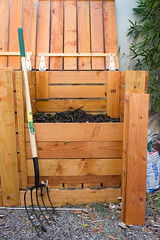Organics,Thursday, July 19, 2007
One of the best ways to improve the soil in a garden is to add lots of home made compost. I started composting after attending a composting workshop provided by the San Jose City. They were selling plastic composting bins at 50% the retail price. The city was subsidizing the purchase of bins for San Jose residents. I made a couple batches of compost with the small little plastic bin and realized that I would need another bin or two in order to be able to have one pile of compost that is finishing while creating a new pile in another bin.
So instead of buying more plastic bins, I decided to create a 3 bin system made out of wood. I found the plans in The Rodale Book of Composting. All 3 bins are connected to each other with lids, removable front slats, and a hatch for throwing fresh material into the first bin. Here’s a photo of 1 of the 3 bins.
The 1st bin, on the far left, is for the fresh material. It’s called the holding bin. Once the holding bin is full, I move the contents to the middle bin and mix the proper amount of moisture, greens and dry material to get the composting action at it’s highest. My current batch stayed at 160 degrees for nearly a week! After it’s finished, I move it to the far right bin to settle and be used in the yard. Meanwhile, new material is continually added to the holding bin and the process can start again once the holding bin is full.
I not only gather material from our yard and kitchen, but I also go out to the curb on trash day and pick up grass clipping and leaves that neighbors bring to the street. I just wheel my wheelbarrow out there and get the good stuff for composting. I’ve been reading that human urine is actually a very good activator for composting, so I’m also considering getting a little bucket to put on the side yard! Heck, it’s good for the compost bin and I don’t have to waste water flushing it down the toilet. What a double blessing! 
To see all the compost bin photos, Click Here
Organics,Wednesday, April 11, 2007
Even I’ve heard the complaints that Organic, Sustainable eating is more expensive. Our household spends about $2500 more per year to eat organic food when compared to the person who just shops at Albertsons. There’s a group of people that are taking up the challenge to eat local, farm fresh food under a typical average American family budget. Check out their site and watch for the results. Click Here for the Eat Local Challenge
Organics,Wednesday, April 11, 2007
Here’s a concise article that explains the basic definition of a “factory farm”. Jenn and I are following the advice they mention. Buy direct from local farmers who use the farming practices that we approve of. Check some of the links in the links section of our site to see some of the places we use to get local, farm fresh food. Click Here for the Factory Farming Summary
Organics,Saturday, March 31, 2007
Drug companies are trying to use genetically engineered seeds to grow crops that produce compounds to make drugs. This practice is very dangerous to our food supply and cross contamination is a certainty. Fields growing genetically engineered crops have already proven to contaminate neighboring crops. This problem has already wrecked the lives and reputation of farmers. Now, with pharmaceutical companies growing crops for use in drugs, the problem can escalate to harmful health problems from accidentally consumption of “pharma” plants. Union of Concerned Scientist put up a website that describes in detail, all the concerns, how to find out about these crops in your area, and a petition that you can sign to help stop it. Click Here
Organics,Friday, January 12, 2007
A latest study find that meat production is now producing more greenhouse gases than our cars. No doubt that the industrialization and feedlot style of raising livestock to make cheap and abundant meat is contributing to this problem. One solution is simply to eat less meat, but you can also get your meat from rancher who employ more environmentally friendly means of raising grass fed only cattle. The cattle our family eats never sees a feedlot. Sure, it’s more expensive, but it’s a double positive for the atmosphere. We eat less meat and the cattle operation produces less greenhouse gases. For the full article, click Here
![]()
